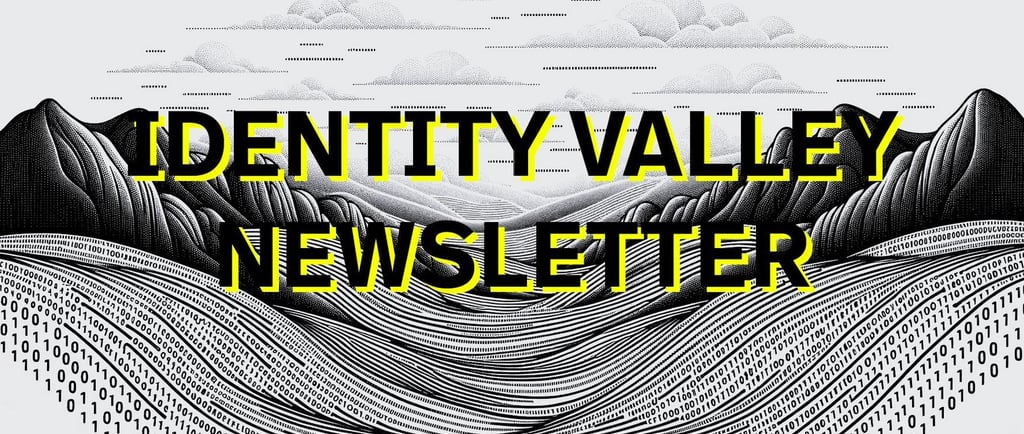IDENTITY VALLEY NEWSLETTER #3
NEWS
11/5/2024


Rebuilding Trust: AI's Greatest Frontier
Identity Valley's core claim is: It's all about trust. This is no empty platitude, but a recognition that our unprecedented progress has depended on our ability to cultivate systems of trust that extend far beyond regional communities.
However, the past years of digital transformation of our societies have put significant strain on these trust systems, with the rapid advancement of AI adding further pressure. Tellingly, according to the recent Edelman Trust Barometer 2024 around half of EU and US citizens are wary of AI, while just under 20% embrace it. This is set to become a mounting challenge for economies and societies that have declared AI the future and pinnacle of technological achievement.
To address this, we must make a concerted effort to rebuild trust in the digitalisation, in particular AI. This means making (generative) AI itself more trustworthy, but crucially this means also considering the appropriate contexts for its application. For example, even a trustworthy AI chatbot will not be suited to create novel knowledge as "AI research assistant" because LLMs just don't work that way.
Beyond generative AI, we need to find ways to foster greater trust in the increasingly AI-driven digital world more broadly. Isolated, in-house initiatives for digital trust will not be enough - we require independent, holistic and collaborative approaches to move the needle. Crucially, the public sector must develop a clear strategy for and drive the creation of digital public infrastructure as a moonshot project. For example, scalable technical solutions to distinguish bots from humans online to counter AI-driven uncertainty could be transformative.
In short, we need solutions for trust in AI, but also trust despite AI. We have a few ideas to explore in this direction in the coming months - stay tuned for more.
- Ferdinand Ferroli, Director Policy & Research
What we are reading
Two timely studies illuminate AI's influence on human cognition: Costello et al. show AI dialogues can effectively reduce conspiracy beliefs through personalised persuasion, while Chan et al. demonstrate how AI conversations can "implant" false memories in witnesses. Together, they underscore a crucial balance: leveraging AI's potential for positive change while carefully guarding against manipulation of human behaviour and beliefs.
The Digitalist Papers brings together diverse thinkers like Lawrence Lessig, Audrey Tang, and Lily L. Tsai to explore AI's impact on democracy and governance. Each essay offers a unique perspective on how technology could transform, support, or challenge societal structures
Take 9 is a thoughtful cybersecurity initiative encouraging users to take a 9-second pause before clicking, sharing, or downloading online content. This quick pause helps individuals make more mindful choices to prevent cyber risks and foster a safer digital environment.
We read Marc-Uwe Kling’s Views, a tense thriller that examines the risks of viral media and AI manipulation. The story follows Inspector Yasira Saad as she investigates a disturbing video that quickly stirs social unrest and fuels extremist rhetoric.
But we are not only reading but also writing (unfortunately, two pieces only in German). In the September issue of "ZD - Zeitschrift für Datenschutz" we wrote about how anonymous our data actually are and how they could be managed in a way that prioritizes individual sovereignty. And, we have contributed a piece to the "Sammelband Menschenzentrierte Digitalisierung" (Human-centered digitalisation reader) of CDR-Initiative which will be officially presented on 14 November in Berlin. Lastly, we contributed a paper to the the eHealth Conference 2024 in Budapest describing our approach in the TEAM-X research project and the DRG4FOOD project published a comic book explaining the Digital Responsibility Goals and the data-driven food sector.
Connect & Share
As we are always looking to find like-minded people and expand the responsible tech community subscribe to this newsletter if you want to stay connected or share if you think someone else might be interested.


Hidden gem
"OpenAI has set back the progress towards AGI [Artificial General Intelligence] by 5-10 years because frontier research is no longer being published and LLMs are an off-ramp on the path to AGI".
- François Chollet, Software engineer & AI researcher @ Google
Some upcoming events
November 14-15, Helsinki
November 15, Paris
November 20-21, Brussels
IAPP Europe Data Protection Congress
November 28, Vienna
Für generelle Fragen:
info@identityvalley.org
Für job-bezogene Fragen:
jobs@identityvalley.org
Kontakt
Folgen Sie uns
Als gemeinnützige Organisation verpflichten wir uns in allen Aktivitäten zu höchsten ethischen Standards. In unserer Zusammenarbeit mit Partnern aus Wissenschaft, Politik und Wirtschaft setzen wir auf transparente, faire und kartellrechtskonforme Praktiken – von Forschungskooperationen über Vernetzungsformate bis zu Standardisierungsinitiativen.
Bei all unseren Aktivitäten bemühen wir uns um den Einsatz vertrauenswürdiger digitaler Technologien, um so digital verantwortungsvoll zu handeln. Gelegentlich, wenn es keine Alternative gibt, greifen wir auf weniger wertorientierte digitale Lösungen zurück. Wir arbeiten jedoch kontinuierlich an einer Welt, in der vertrauenswürdige digitale Lösungen immer weiter verbreitet sind.


©Identity Valley 2025